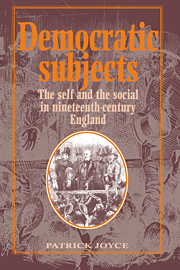Book contents
- Frontmatter
- Contents
- List of plates
- Acknowledgements
- Introduction
- Part One The sorrows of Edwin Waugh: a study in ‘working-class’ identity
- 1 Young Edwin
- 2 The struggle for the moral life
- 3 The ends of the moral life
- 4 The cult of the heart
- 5 ‘God bless these poor folks’
- 6 The legacy of Edwin Waugh
- Part Two John Bright and the English people: a study in ‘middle-class’ identity
- Part Three Democratic romances: narrative as collective identity in nineteenth-century England
- Appendices
- Index
2 - The struggle for the moral life
Published online by Cambridge University Press: 10 December 2009
- Frontmatter
- Contents
- List of plates
- Acknowledgements
- Introduction
- Part One The sorrows of Edwin Waugh: a study in ‘working-class’ identity
- 1 Young Edwin
- 2 The struggle for the moral life
- 3 The ends of the moral life
- 4 The cult of the heart
- 5 ‘God bless these poor folks’
- 6 The legacy of Edwin Waugh
- Part Two John Bright and the English people: a study in ‘middle-class’ identity
- Part Three Democratic romances: narrative as collective identity in nineteenth-century England
- Appendices
- Index
Summary
Edwin Waugh began his diary in May 1847, after pasting in a number of newspaper and other cuttings concerning the use of a diary, and the nature of the life the diary was designed to guide and build. For this man the confessional mode of the diary was a direct intervention in the world, a quite literal exemplification of the text constituting the world. The life that he aimed to build was above all a moral and spiritual life.
In his invocation of the magic of the book Waugh summons the presence of its high priests before beginning his own. ‘Reading makes a full man, conversation makes a ready man, and writing an exact man’, from Bacon's Essays, is followed by Emerson, ‘The main enterprise in the world for enterprise and extent is the upbuilding of man’ (as we shall see, Emerson the priest of education and improvement is for Waugh almost a god). Another tag he posts in the flyleaves of his diary is ‘More people have gone to the gibbet for want of early instruction, discipline and correction, than from any incurable depravity of nature.’ Waugh is Enlightenment man, the archetypal ‘working man’ autodidact in his belief that knowledge is the key to freedom.
- Type
- Chapter
- Information
- Democratic SubjectsThe Self and the Social in Nineteenth-Century England, pp. 41 - 48Publisher: Cambridge University PressPrint publication year: 1994



